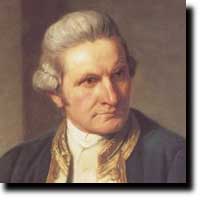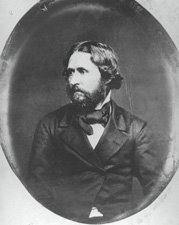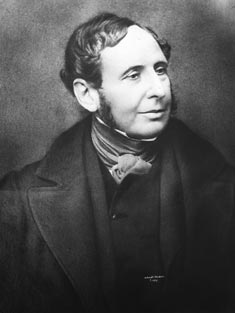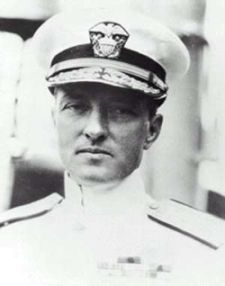Discovery.
This is coolbert:
It is undeniable that many expeditions of discovery and scientific exploration have had a largely military dimension to them.
Expeditions of discovery and scientific exploration that had to have the steady hand of military discipline and organization to be successful.
Within the Anglo-American example there are many such instances of scientific expeditions and expeditions of discovery organized along military lines.
1. The many voyages of Captain Cook are perhaps the archetype in this regard.
Captain James Cook himself was a remarkable man, to say the least.
"... the ablest and most renowned navigator this or any country hath produced. He possessed all the qualifications requisite for his profession and great undertakings ..."

NOT a commissioned officer. A non-commissioned officer. A petty officer. Was not a gentleman by birth or a man of independent financial means. But was perhaps the greatest sailor of his time. And recognized as such by his peers. Possessed a lot of leadership ability and motivational skills. Was far ahead of his time in his fair and honest dealings with "natives" [unfortunately, his last voyage to Hawaii was not so well received]. Commanded a collier [a ship designed to carry coal] on several of his voyages to the south Pacific. Such was the skill and sailing ability of Cook, that he did not require beyond what was given him in the way of a ship.
[it was not the ship that counted, it was the man commanding the ship that counted.]
Sailed the length and breadth of the Pacific Ocean, northerly and southern waters, Polynesia. Nearly discovered Antarctica on one voyage. Also penetrated Alaskan waters while exploring the west coast of North America. His scientific expeditions and voyages of discovery are considered to be exemplary. The model for all to follow!
"a man who, in the opinion of the French Navigator Jean-Francois de Galaup de La Perouse carried out work that was so all-encompassing that there was little for his successors to do but admire it."
[the Cook Islands, Cook Sound [NZ], and Cook Inlet [Alaska], all are named after Cook, such was his presence.]
2. The Lewis and Clark Expedition [The Corps of Discovery] was organized along military lines. Both Lewis and Clark WERE serving officers in the American Army. Had a mix of military and civilian personnel under their command. The Corps had to be able to fight and defend themselves at a moments notice if necessary, whether it was from hostile Indian tribes or elements sent north by the Spanish government. [It is a fact that the Spanish government DID send a war party north in an attempt to intercept and annihilate the expeditionary Corps. A confrontation did not occur, but could have]. The Lewis and Clark Expedition did make a whole range of scientific observations along the way, having been trained by the most eminent American scientists of the day to do so.
[it has even been suggested that Lewis, after completion of the expedition, fell into melancholy and was a suicide. Life for him after the Corps was all chaff. NOT interesting and not worth living for. Such possibly was the profound legacy of what Lewis and Clark and his party of explorers experienced!!]
3. John C. Fremont. "The Pathfinder". A long-term serving military officer. Led numerous expeditions to the "west". That part of the United States at that time west of the Mississippi River. Uncharted lands only recently explored by "white" fur trappers. Found the most expeditious means for east to west overland movement within the North American continent. Used the most up-to-date means available for charting, mapping, and surveying the area claimed by the burgeoning United States.

"Fremont assisted and led multiple surveying expeditions through the western territory of the United States. In 1838 and 1839 he assisted Joseph Nicollet in exploring the lands between the Mississippi and Missouri Rivers, and in 1841, with training from Nicollet, he mapped portions of the Des Moines River. From 1841 to 1846 he and his guide Kit Carson led exploration parties on the Oregon Trail and into the Sierra Nevada. During his expeditions in the Sierra Nevada, it is generally acknowledged that Fremont became the first Caucasian to view Lake Tahoe. He is also credited with determining that the Great Basin had no outlet to the sea. He also mapped volcanoes such as Mount St. Helens."
[it should be noted that American military officer graduating from the Military Academy at West Point received degrees as engineers. Were required to make their own maps, be conversant with surveying and topography. This was a long standing legacy within the American military. Both George Washington and George Rogers Clark, when young men, honed their leadership skills and command ability while leading surveying teams.]
4. The five year around-the-world voyage of the HMS Beagle, commanded by Captain FitzRoy, had unexpected results that were of the most profound nature. Primarily a charting expedition, also aboard the Beagle was the naturalist Charles Darwin. Darwin during this expedition made many new scientific finds and observations that stimulated his thought in an manner unforeseen at the time. Stimulation of thought that later led Darwin to formulate his Theory of Evolution.

[Darwin is one of four men that most have influenced modern thought. Marx, Freud, and Einstein are the other three. Without the voyage of the HMS Beagle, Darwin might never developed his theory.]
5. The various expeditions commanded by Richard Byrd, USN, to the polar regions, north and south, contributed mightily to the knowledge of the last areas on the surface of the earth to be mapped and explored in a systematic and scientific manner.

Utilizing the latest in technology to do so, Byrd was able to conduct his explorations in a modern manner, using aircraft and radio communication whereas previous explorers had to be reliant on dog sled!! In 1959, the International Geophysical Year [IGY] was DEVOTED SOLELY TO EXPLORING ANTARCTICA. Methods and technology first developed and employed by Byrd and the United States Navy were used on a massive scale. So successful was the IGY that the Antarctic became an international refuge depoliticized and free from governmental machinations and intrigue found on the rest of the planet.
6. The successful British Mount Everest expedition of 1953 was organized along military lines, commanded by a serving British Army officer, Colonel John Hunt. It had become apparent that to attain the summit of Everest was a matter given only to a large scale expedition that had the aspect of a military operation. Teams of climbers, supported by a large number of Sherpas, the entire climbing part supported by a battalion of porters, all required an organizational skill and command presence and discipline of a military man. A man such as Colonel Hunt, a military officer with alpine climbing experience. Where other expeditions to Everest had failed, the climbing part of 1953 did not.
All this just for the Anglo-American example!! You could probably go on an on with this!
There is a long standing and proud tradition in the military of exploration/discovery/scientific endeavor. NO contradiction exists here.
coolbert.

1 Comments:
Of course there's no contradiction! Whatever made you think there was?
Heck, even the Enterprise had naval ranks.
9:26 PM
Post a Comment
Subscribe to Post Comments [Atom]
<< Home